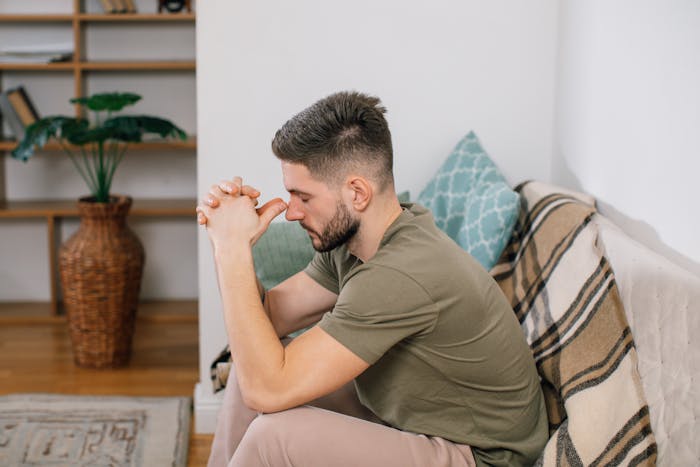There is a mental health crisis going on across the UK, and when it comes to the West Midlands and Birmingham in particular, more people than ever are struggling with their mental health.
Below are some statistics on the state of mental health in Birmingham, as well as the reasons behind the crisis and some top tips on how you can improve your own mental health if you live in and around the Birmingham area.

As discussed above, the mental health crisis in Birmingham is getting worse, with an estimated 24% of adults in the West Midlands now experiencing mental health problems on a daily basis [1].
This has a huge economic burden on local services, including costing the local NHS trust an estimated £12 billion each year just in the West Midlands alone [1].
The most common mental health condition across Birmingham and the rest of the West Midlands is depression, with an estimated 1 in every 5 adults living in the area suffering from some form of depression [1].
The next most common mental health condition is anxiety, with 1 in every 10 people living in Birmingham and the surrounding area struggling from anxiety [1].
It is also estimated that 1 in every 100 people living in Birmingham struggles from a more severe mental health condition such as bipolar disorder or schizophrenia [1].
When it comes to self-harming in Birmingham, hospitality admissions actually fell between 2020 and 2021.
However, sadly, suicide rates rose over 1.3% between 2012 and 2020, which now matches England’s average for suicide rates across the rest of the country [1].
Moreos, a survey carried out by Healthwatch Birmingham in 2024 found that out of almost 100 service users (those seeking addiction rehab treatment in Birmingham) almost 50% would deem the local services for mental health either ‘poor’ or ‘very poor’ [2].
This is due to the fact that 22% of all individuals surveyed waited between 3 and 6 months for an initial appointment with a doctor [2].
Of these individuals, 57% were prescribed medication for their mental health illness, and just 19% received talking therapy as a treatment option [2].
Finally, 46% of people who needed treatment and reached out for help struggled to get in contact with their care providers when they needed to [2].
Unfortunately, not everyone gets the treatment they need and service when it comes to their mental health.
Unfortunately, over 300 individuals with mental health issues who live in the Black Country went missing between 2017 – 2022, with some of these cases ending in a fatal suicide or suicide attempt [2, 6].
As explained above, mental health across Birmingham is getting worse, and the services that are supposed to help individuals who are suffering are falling short.
There are a number of different reasons why people in Birmingham are struggling with their mental health, some of which are explained below for you.
Studies have shown that since 2010, Birmingham City Council has reduced the amount of funding given to community services by approximately 18% [3].
As a result of this, demand for mental health services is rapidly increasing, with referrals spiralling out of control due to a lack of support within local community services.
Due to this, waiting lists are longer than ever [2]. This is having a butterfly effect on wider services and across the community, with over 5,000 families in Birmingham City Centre living in temporary or overcrowded accommodation.
These types of issues worsen mental health, increase isolation and loneliness and even make it more likely that you will suffer from drug and alcohol addiction.
Unfortunately, Brimingham has one of the UK’s highest rates when it comes to deprivation and poverty, which could be having a huge impact on mental health in the area.
Birmingham City Centre in particular is the worst it’s ever been when it comes to unemployment rates, poverty and inequality, especially when it comes to children [4].
This is naturally going to have a huge impact on mental health, as many people who live in poverty suffer from anxiety, depression and bipolar disorder.
In terms of mental health treatment, Birmingham and Solihull ICS reported that there is currently a huge shortage of local psychiatric beds across the area, with a 30% rise in people having to be relocated and placed out of the area so that they can get a bed in a psychiatric ward.
This is bound to have a huge impact on those who suffer from a mental illness, as relocating people who suffer from poor mental health is only going to have a negative impact on them as you move them away from everyone they know and any form of support that they might be able to benefit from.
When it comes to children, 30% of all children who needed this type of help had to move away from their home and local area [5].
This could have a huge impact on those who suffer from poor mental health and could be a huge contributing factor when it comes to relapsing once people leave their treatment.

If you struggle with poor mental health and live in the Birmingham area, then there are a number of things that you can do to improve your mental health.
Some of these are discussed below.
If you struggle with poor mental health in Birmingham or the surrounding area, then it is important to seek help.
If you are suffering from severe mental health and are a danger to either yourself or to those around you then you should call 999 or go to your nearest A&E department.
If your mental health illness is less severe, but you still need treatment, then speak to your local GP to see what services might be available to you.
For example, you might be able to get treatment from Birmingham Healthy Minds or Forward Thinking Birmingham.
One of the best things that you can do for your mental health is get out in nature. Spending time in nature has been proven to reduce stress and anxiety and even help when it comes to depression.
There are a number of recommended green spaces across Birmingham, including Cannon Hill Park, Sutton Park and Likely Hills Country Park.
When there, you should try your best to absorb nature and take your time to admire your surroundings.
There are a range of local support groups available to those who live in Birmingham who suffer from poor mental health, including Mind Birmingham and The Waiting Room.
Speaking to others who also suffer from mental health issues can help you a lot in your recovery journey and remind you that you are not alone.
Regular exercise can have a huge impact on your mental health, and has been proven to reduce your stress levels, boost your overall mood and help you to feel more positive and less depressed.
This is because exercising has been proven to reduce your brain’s levels of cortisol and increase your brain’s levels of dopamine, which is the feel good neurotransmitter.
There are a number of places you can go to exercise across Birmingham, including The Gym Group, Pure Gym, Park Runs at Cannon Hill and numerous yoga studios across the city centre.
Self-care should not be overlooked, as it can do wonders if you are feeling stressed or particularly low. You should always aim to get a balanced diet, practise mindfulness, get enough sleep and make sure that you prioritise your hygiene and socialising with friends and family.
There are a range of different places across Birmingham where you can prioritise your self-care and mental health, including local cafes such as Faculty Coffee, Cherry Red’s Cafe and Saint Kitchen or by booking yourself a mindfulness or spa retreat such as Fairlawns Hotel, Moor Hall Hotel and Champneys Spring Hotel.
Remember, if you are suffering from severe mental health issues, then it is important that you seek professional help from a trained professional.
If your mental health issues are getting worse and you feel like you need professional help, then there are a range of services available to you.
If your mental health issues are so severe that you feel like you are a danger to either yourself or to someone else, then you should call 999 to take yourself to a local A&E department.
If your mental health illnesses are less severe, then you might want to engage in talking therapy. There are a range of therapy and counselling services available to you, including Relate Birmingham, The Priory Wellbeing or The Kaleidoscope Plus Group.

It is a well-known fact that there is a strong link between addiction and mental health. The link between the two illnesses is complex and bidirectional, meaning that each influences the other and in this instance, has a negative impact.
Drugs and other substances have an impact on the brain, altering the chemicals in the brain, altering brain function and worsening mental health issues.
Likewise, addiction to drugs and alcohol also tends to lead to social isolation, job loss, relationship breakdowns and then anxiety and depression.
Likewise, those who suffer from mental health issues often go on to experience a substance use disorder as they look for a crutch to lean on when things get tough.
When individuals suffer from a mental health issue alongside an addiction issue, they are deemed to have a dual diagnosis.
A dual diagnosis is when someone is suffering from more than more mental health illness at the same time, including an addiction issue.
If you are suffering from a mental health issue alongside an addiction issue, then you should speak to a member of the team at Rehab 4 Addiction.
Our team of specialist advisers will talk you through the rehab process but will not put any pressure on you to attend rehab.
Our team will likely ask you a few questions about the severity of your addiction as well as what type of substances you are addicted to so that we can recommend the best form of treatment for you.
To get the treatment you need, speak to a member of the team by calling us on 0800 140 4690 or by visiting us online by searching for www.rehab4addiction.co.uk.
[2] https://healthwatchbirmingham.co.uk/report/community-mental-health/
[4] https://sharedhealthfoundation.org.uk/publications/child-mortality-in-temporary-accommodation-2025/